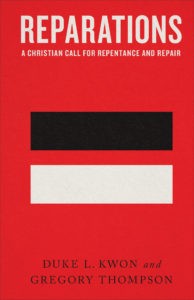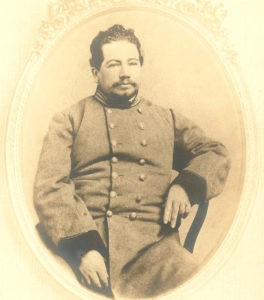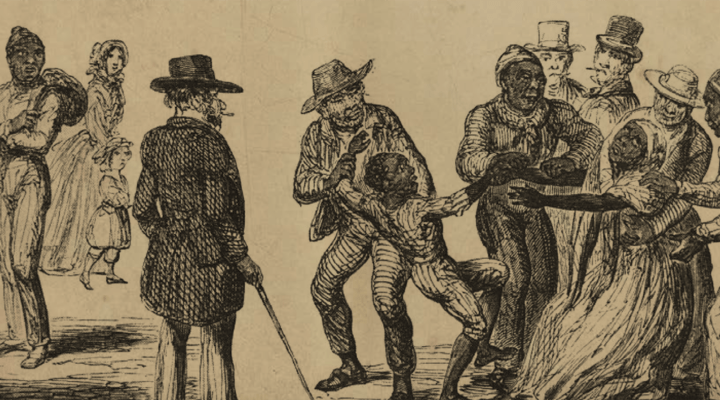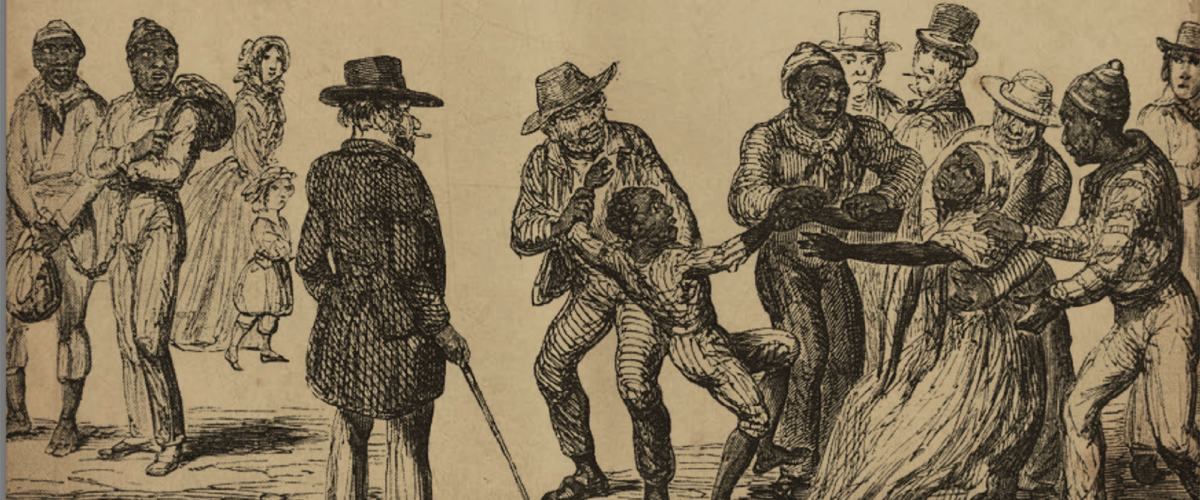Since publication of their new book addressing a Christian view on reparations for descendants of formerly enslaved Americans, Gregory Thompson and Duke Kwon have been met with harsh criticism by the “Anti-Anti-Racist Evangelical Complex.”
That’s the best name I can give this conglomerate of evangelicals who object to the mere consideration of reparations, embodied in Thompson and Kwon’s book, Reparations: A Christian Call for Repentance and Renewal.
 In April, The Gospel Coalition published a review of the book by Kevin DeYoung, senior pastor of Christ Covenant Church in Matthews, N.C., and associate professor of systematic theology at Reformed Theological Seminary in Charlotte, N.C. The Gospel Coalition describes itself as “a fellowship of evangelical churches in the Reformed tradition deeply committed to renewing our faith in the gospel of Christ and to reforming our ministry practices to conform fully to the Scriptures.”
In April, The Gospel Coalition published a review of the book by Kevin DeYoung, senior pastor of Christ Covenant Church in Matthews, N.C., and associate professor of systematic theology at Reformed Theological Seminary in Charlotte, N.C. The Gospel Coalition describes itself as “a fellowship of evangelical churches in the Reformed tradition deeply committed to renewing our faith in the gospel of Christ and to reforming our ministry practices to conform fully to the Scriptures.”
While commending the authors on their research, DeYoung questions their interpretations and conclusions. For example, he writes: “What’s more debatable is whether racism and white supremacy are embedded in every institution and encoded in every aspect of our society. One can be honest about our nation’s sins and shortcomings while still insisting that America wasn’t founded on white supremacy.”
On July 19, Thompson and Kwon published a rejoinder to DeYoung’s review, forcefully rebutting the oft-repeated evangelical objections to reparations.
For more on the debate and the stunningly deep-seated vitriol within the aforementioned conglomerate, review the many replies and quotes of The Front Porch’s tweet about the review and response.
One response from a Southern Baptist scholar epitomizes the needlessly ridiculous rhetoric and inaccurate self-assessment of these custodians of truth.
Andrew Walker serves as associate professor of Christian ethics and apologetics, associate dean of the School of Theology, and director of the Carl F.H. Henry Institute for Evangelical Engagement at Southern Baptist Theological Seminary in Louisville, Ky. He is, by all accounts, a leading evangelical voice in the fight against the threats of the new postmodernity, along with contemporary theological and political progressivism.
“One response from a Southern Baptist scholar epitomizes the needlessly ridiculous rhetoric and inaccurate self-assessment of these custodians of truth.”
I had the privilege of shaking his hand at the Southern Baptist Convention’s annual meeting in Nashville, and although we talked only for about 30 seconds, his disposition was bright. I also want readers to know that I am deeply appreciative of his contributions. I have stood and will continue to stand with anyone who opposes threats to religious liberty.
And yet, I would be remiss if I failed to mention how his response to Thompson and Kwon reflects the broader racial tone-deafness in the present evangelical milieu of which many, if not most, of the brothers and sisters in my local church are painfully aware.
 Of Thompson and Kwon’s rebuttal to DeYoung, Walker tweeted: “This is poisonous, anti-gospel rhetoric and it should be called out as such. And it’s not fringe. It’s increasingly the lingua franca in many sectors of ruling class evangelicalism.”
Of Thompson and Kwon’s rebuttal to DeYoung, Walker tweeted: “This is poisonous, anti-gospel rhetoric and it should be called out as such. And it’s not fringe. It’s increasingly the lingua franca in many sectors of ruling class evangelicalism.”
It is worth noting that a man with Walker’s credentials could be considered to be among those in “ruling class evangelicalism.” He not only boasts of serving in three different posts at Southern Seminary but also serves as a fellow at the Ethics and Public Policy Center, as an editor for Public Discourse, and as executive editor for the Council on Biblical Manhood and Womanhood’s journal, Eikon.
This is, by the way, not to comment on Walker’s choice to employ language from a Marxist framework — a framework which I am certain he and his colleagues vehemently oppose. It seems if there is, in fact, an evangelical proletariat, Walker and those in his realm would be the very ones guilty of drowning the “most heavenly ecstasies of religious fervor, of chivalrous enthusiasm, (and) philistine sentimentalism” of the average evangelical “in the icy water of egotistical calculation.” Is it, perhaps, indeed time to overthrow our evangelical overlords?
On a more serious note, I find his charge that Thompson and Kwon are employing “poisonous” and “anti-gospel” rhetoric to be entirely lacking in substance and completely unnecessary. If we are to take his words as a call to “theological arms,” I must admit that I find it about as inspiring as a timeshare pitch.
“If we are to take his words as a call to ‘theological arms,’ I must admit that I find it about as inspiring as a timeshare pitch.”
And yet, there is a question from this evangelical conglomerate of self-appointed arbiters of gospel truth that remains conspicuously unanswered: Would this present discussion concerning reparations and the dismantling of unjust social systems even be necessary were it not for the abysmal failure of our theological forerunners?
Consider the namesake of Boyce College and one of the founders of Walker’s very own Southern Seminary, James Petigru Boyce. By his own admission, Boyce’s views were “ultra proslavery.” He was the owner of at least 23 slaves. He once gave a rousing speech declaring, “This is a white man’s government.” He served in the treacherous Confederate army. Other founders of Southern Seminary argued that Africans deserved to be enslaved in view of their permanent curse from God after the Deluge.

James Petigru Boyce, founder of Southern Baptist Theological Seminary and namesake of Boyce College, shown in his Confederate uniform, which he wore as a chaplain for a South Carolina infantry regiment, 1861–1862.
Complicating this question are the unhelpful comments of Albert Mohler, president of Southern Seminary. In response to the unfortunate decision of Southern Seminary’s trustees to retain the Boyce College name, along with several buildings named after slaveholders, Mohler sang the praises of the founders: “We stand in conviction on the great truths of the Christian faith and in confessional agreement with our founders. Their theological orthodoxy and Baptist confessionalism are an invaluable inheritance, and we stand with them in theological conviction, period. But we deal honestly with their sin and complicity in slavery and racism.”
Mohler’s take is as tone-deaf as it is misguided. Do we really long to stand in theological conviction with enslavers and abusers? Why is it we do not celebrate the “theological orthodoxy” and “Baptist confessionalism” of those who opposed the founders, such as the founders of the National Baptist Convention? Is it really the case that the convictions of Southern’s founders are our convictions?
Make no mistake about it: The views of the founders on slavery and race were inherently theological. It cannot be said enough that their orthopraxy was the direct result of a fundamentally flawed and, dare I say, heretical system of so-called “orthodoxy.” Mohler’s thesis is patently false.
“If we really shared the doctrinal convictions of the founders of Southern Seminary, we would believe that Black people are permanently cursed through Cain and/or Ham and that chattel slavery was a divine institution.”
If we really shared the doctrinal convictions of the founders of Southern Seminary, we would believe that Black people are permanently cursed through Cain and/or Ham and that chattel slavery was a divine institution. Their “orthodoxy” is no orthodoxy at all. It is a deviation from the Christian gospel, and it is not possible to separate their abominable practices from their deviant theology.
But don’t take my word for it. This is the witness of inspired Scripture. Enslavers are contrary to sound doctrine (1 Timothy 1:10). Whoever hates their brother is a liar and does not know God (1 John 4:21). The Apostle Paul expected Philemon’s cooperation and obedience to his apostolic admonition to receive Onesimus no longer as a slave (Philemon 15-16, 21). Our egalitarian oneness in Jesus Christ demands we not treat others differently because of any social distinction (Galatians 3:28). God’s kind providence directs us to God’s own good purposes for us in Jesus Christ (Romans 8:28). God has not ordained that we should abuse our fellow image-bearers.
This glowing reminiscing of their “legacy” from multiple pro-founders’ parties tempts one to consider whether or not the contemporary Southern Baptist establishment believes that chattel slavery was, in fact, sinful. As a matter of fact, some have publicly insinuated that it wasn’t.
And so I close by asking, in Walker’s own terms: Did James Petigru Boyce (and his associates) spew out what can only be described as “poisonous” and “anti-gospel” rhetoric that reflected the mainstream (not fringe) lingua franca of the then-ruling class of evangelicalism? If so, is he willing to reject it and call it out as such? Seeing as my interlocutor is the heir of the theological architects of the Lost Cause, the Curse of Ham, Manifest Destiny, and chattel slavery, I remain doubtful.

David Bumgardner
David Bumgardner is known to those attending this year’s SBC annual meeting as “The A/C Guy” because of his moment of fame at a microphone. He is a 22-year-old senior at Texas Baptist College, theologian-in-training, evangelist and content creator from Fort Worth, Texas. He is passionate about gospel-focused theology and Christ-centered expository preaching. He is a member and minister at Cornerstone Baptist Church in Arlington, Texas, where Dwight McKissic is pastor. Follow him on Twitter @david_bumg.
Related articles:
Ways of seeing racism | Opinion by Gregory Thompson and Duke Kwon
Baptist Calvinists defend slavery of Southern Seminary founders | Analysis by Brian Kaylor
Southern Seminary won’t rename buildings but creates scholarships for Black students
Southern Seminary leadership nixes idea of reparations for historically black college


